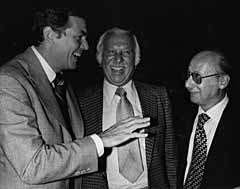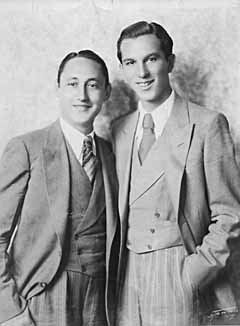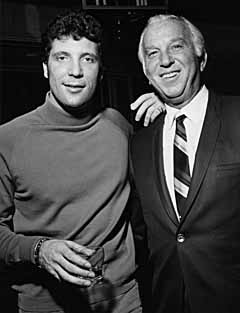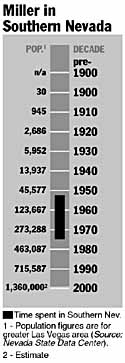Bill Miller





Seductive 1930s screen actress Mae West still looked pretty good by the mid-1950s, enough so that she still was able to pack the guys in just by showing up. They came to see flashy costumes wrapped tightly around her generous hourglass figure. And, of course, to hear her famed witticisms. She would slither up to a front row customer, give him the up-and-down scan, and issue her trademark invitation.
“Why don’t you come up and see me some time? Make it Tuesday, that’s amateur night.” But she was a screen star, not a nightclub performer.
“I brought in people nobody believed could do a nightclub act,” says Bill Miller, the man who virtually invented the Las Vegas lounge show. “For instance, do you think you could ever get Mae West to play in a nightclub? I did.”
Adds his former colleague, Bill Layne, “He was an innovator; he brought in stars nobody else could get to play Las Vegas, and by doing that, he permanently raised the standard for Las Vegas entertainment.”
Miller, a relatively robust 94, allowed that time was on his side when he booked West at the Sahara in 1954. Her last major screen appearance was 11 years behind her, she was 61 years old, and was traveling with a marginally successful stage revue. Miller hired a group of spectacularly buffed-out male bodybuilders. Clad only in bathing trunks, they posed, flexed and strutted. West leered, inspected lats, delts and pects and fluttered her eyelashes in excitement.
“I wrote her a song for the very finish,” laughs Miller. “It went, ‘I’ve got something for the girls: boys, boys, boys.` ”
Not only were Mae West and her muscular minions a crowd-pleaser in Las Vegas, they subsequently played to sellout crowds in New York and Atlantic City.
He admits to booking only one real flop — Zsa Zsa Gabor. “People came to see her, but she didn’t really have an act,” he shrugs.
William Miller was born in 1904 in Pinsk, Russia, the son of David and Lena, Jews who wanted to get to America.
“I was 1 year old when they brought me over.”
Miller doesn’t know his original family name. He suspects it was lost at Ellis Island, when an official asked David his name, and he instead told him his occupation. Somehow, the immigration official heard “Miller” and that became the family’s American name.
“And that’s as far as we know about it,” says Miller. “And I never did find out.”
The family settled first in Brooklyn, then moved to Jersey City. David Miller was an accomplished building tradesman and was soon making a good living.
“We went through the Depression,” he says. “But I never remember ever being hungry at home.”
By the end of his second year in high school, Miller had already decided on a show business career, and he dropped out of school to pursue it. His father obligingly provided him with 50 cents a week to take violin lessons. He took a few, but he usually spent the half-buck to see a vaudeville show.
“I loved the theater, and in those days it was all live shows, no movies or anything. I fell in love with the dancers. I’d follow their steps, then go home and practice. I finally had enough steps for a good routine.”
At an amateur show in the early 1920s, Miller performed his dance, then watched in amazement as another young man did virtually the same act. Miller surmised that the lad learned his steps the same way he had.
“The producer said, ‘You two fellows dance so much alike, we can’t use both of you doing the same routine. Why don’t you get together?` ”
Thus was born the dancing duo of Miller and Peterson. They decided they needed an agent, and struck out for New York’s Palace Theatre, where several talent agents kept offices.
On the way over, they noticed signs plastered all over town advertising the spectacular “Miller and Lyle Revue.” Miller hatched a scheme. Arriving at the Palace, Miller whispered to Peterson, “You just sit. I’ll do the talking.”
Brimming with chutzpah, Miller strode to the receptionist and asked to speak to an agent. “Tell him Bill Miller, the son of Miller of Miller and Lyle, would like to see him.”
The agent was concluding a phone call as Miller was escorted into his office. He hung up, looked around, then called the receptionist.
“So where’s this Miller kid?”
“He’s there in your office,” she said.
The agent turned to young Bill.
“You’re Bill Miller, the son of Miller and Lyle?”
“Yes, I am.”
“You know, I’m your Dad’s closest friend. I even keep a picture of him here. Would you like to see it?”
“I’d love to.”
The agent held up a portrait of the famous Mr. Miller who was obviously of African ancestry.
More amused than annoyed, the agent steered the pair to the Palace Theatre Ballroom, where auditions were being held for a new revue. They were signed at the astronomical salary of $75 per week — each. It was their first paying gig, and it was at the venerable Palace.
“The ambition of every performer, and I mean every performer, was to play the Palace in New York. We played there for four weeks.”
He eventually put together his own successful musical comedy revue, with singers, comics and an orchestra dressed in the uniforms of West Point cadets. But he said, “After 10 or 12 years, I had enough, dancing was too tough.” Approaching his 30th birthday, he was ready for a change.
At one of his last engagements, in 1929, the audience was sparse. Up the street, though, people were lining up for blocks to see the new “talking picture” starring Al Jolson as “The Jazz Singer.”
“I decided that my part of the business was over, so I’ll become an agent. And that’s what I did for several years.”
One of the nightclubs where Miller booked many of his clients was the Riviera, in Fort Lee, N.J. It was a swank joint with an illegal casino upstairs. When World War II commenced, it was closed.
Miller bought the club in 1945, renamed it “Bill Miller’s Riviera” and reopened. It was touch and go for the first year, partly because Miller insisted on doing without gambling.
“Regardless of what I did, everyone wanted to know when I was going to open the room upstairs,” says Miller.
Miller was the agent for crooner Tony Martin who was at the zenith of his career and booked at the Copacabana. Miller offered to double Martin’s salary to $10,000 per week if he would open the Riviera. He accepted.
“He was the biggest smash you ever saw,” says Miller. The lineup of acts that followed reads like a who’s who of midcentury popular entertainment.
“Every one of the Rat Pack came from the Riviera,” says Miller. “Sinatra played there, so did Dean Martin and Jerry Lewis when nobody knew who they were. I brought in the Will Mastin Trio, starring Sammy Davis Jr. and also Joey Bishop.”
When the Copacabana Club closed in New York, one of its employees, Jack Entratter, was sent to Las Vegas to handle entertainment at the new Sands Hotel.
“I was still open, and all the acts that I had, he brought to Vegas,” says Miller. “A year later, I found out my place was going to be closed because they were building a highway through it.”
Milton Prell, who had opened the Sahara Hotel in 1952, heard about the closing of Bill Miller’s Riviera, and called.
“We’d love for you to come out and take a piece of this place, and be part of our group,” said Prell. Miller bought a 10 percent interest in the property and was named entertainment director in 1953.
“But all my acts were already taken (by Entratter) so I had to start from scratch. Ray Bolger was the first act I booked at the Sahara.” Bolger, best known as the Scarecrow in “The Wizard of Oz,” was also a popular dancer.
“The trouble with Ray Bolger was that nobody knew how to use him in a nightclub act,” says Miller. “He was a dancer. How many numbers can you do?”
Miller created an act for Bolger, casting him in the role of master of ceremonies of a variety show. Bolger would do a dance bit before introducing each act. Bolger was a hit, as was Miller’s next booking, Donald O’Conner, another hoofer with strong credentials in film and dance revues. And there was Marlene Dietrich, who brought crowds who just wanted to see a legend in the flesh.
But Miller wanted to create a new entertainment venue, one unique to Las Vegas. He thought lounges could produce profits on their own.
“Truthfully, the lounges were a joke,” says Miller. “Oh, they had a violin player or a guitar player or something. I said, ‘This is ridiculous.’ I’ve made all my money in show business selling whiskey. I can make more money selling whiskey than you can gambling.”
As a talent agent, he had formerly represented trumpeter and gravel-voiced vocalist Louis Prima, a Sicilian-American, who had earned some success with energetic arrangements combining swing, Dixieland jazz, Italian folk songs and comedy.
In 1954, Prima called Miller looking for work.
“How would you like to have a seven-year deal?” Miller asked. He offered $3,500 per week for Prima, $3,500 for his partner and wife, Keely Smith, and $3,500 to be split among the backup band, Sam Butera and the Witnesses. He also informed Prima that he would be working in the Sahara’s Casbah Lounge.
“Lounge?” exclaimed Prima.
“You’re going into the lounge, Louie,” said Miller firmly. “You’re going to be there seven years. You’re going to live in the town and you’re going to make more money than you ever did.”
“And there was no one, ever, in the history of show business, that did the business that this man did from midnight until 6 in the morning. You could not get into that club. That was really one of the biggest things that happened in Vegas,” says Miller. “It created people like Shecky Green. All the lounge acts started with Louis Prima.”
In 1955, Miller left the Sahara and bought an interest in the new Dunes Hotel, and signed on as entertainment director. The show budget was tight, but Miller solved it by booking, for $9,500 per week, what would today be called a “production show.” It was called “Smart Affairs.”
“That started all the big production shows you have in Vegas today,” says Miller. “From there, they brought in the Lido de Paris and the Folies Bergere.” Miller’s former producer in New Jersey, Donn Arden, came to Las Vegas in the vanguard of the feathershow phenomenon and he would become one of the city’s leading show producers.
While at the Dunes in 1956, Miller decided to catch a show at The New Frontier. It was a 21-year old kid who had made his TV debut on The Ed Sullivan Show only a few weeks before.
Miller claims he recognized Elvis Presley’s potential the first time he saw him on stage. “I said, ‘Boy, some day I’m going to fire up this guy’s career.` ”
In 1967 Miller, then the owner and operator of a hotel in the Dutch West Indies, was lured back to become the Flamingo entertainment director.
Miller sought unusual acts. One was the husband and wife vocal team of Sonny and Cher.
“They needed the job, and I thought she was great,” says Miller. It was on the Flamingo stage the couple invented the bickering banter that later segued into a hit network television show.
When Flamingo owner Kirk Kerkorian opened the International Hotel in 1969, Miller had a chance to “fire up” Elvis Presley’s career. Of course, Miller had to arm-wrestle “Colonel” Tom Parker.
“We finally got (Elvis) on one condition,” says Miller, “Parker didn’t want him to open in that big 2,000-seat theater. He said that we would have to put someone else in to open, and Elvis would follow.
“So I went to work on Barbra Streisand,” Miller recalls. “She was leaving, on her way to Europe, when I got her to sign the contract. And she opened the International.”
Miller retired to Palm Springs in the mid-1970s.
Longtime Las Vegas showman Ralph Young, half of the act of Tony Sandler and Ralph Young, sums up Miller’s career: “He’s the last of the most knowledgable entertainment directors. He had his finger on the pulse of what was happening at the time.”
Part I: The Early Years
Part II: Resort Rising
Part III: A City In Full












